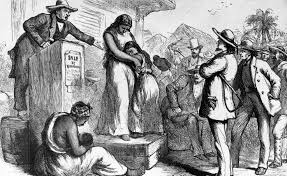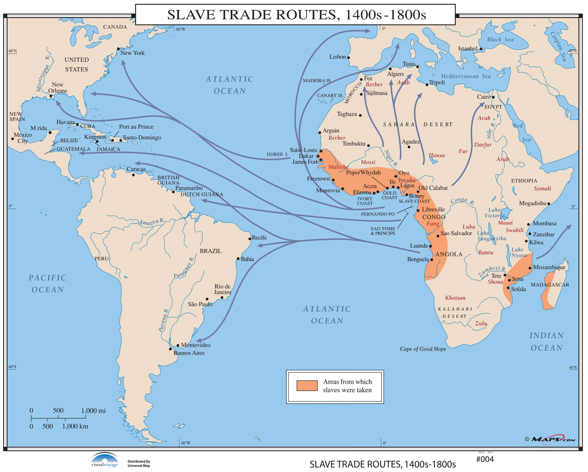| Black Lives Matter | Antisemitism | Hate Crimes |

See also Hate Crimes
Brief history. My non-scholarly attempt as a quick summary.
Slavery:
Throughout the 17th and 18th centuries people were kidnapped from the continent of Africa, forced into slavery in the American colonies and exploited to work as indentured servants and labor in the production of crops such as tobacco and cotton.
 Horrible conditions existed on the ships transporting them; a combination of overcrowding, lack of drinkable water, a bad diet, deadly diseases, and maltreatment resulted in many deaths.
Horrible conditions existed on the ships transporting them; a combination of overcrowding, lack of drinkable water, a bad diet, deadly diseases, and maltreatment resulted in many deaths.
Once they arrived they were sold at auction frequently breaking up families.
Girls were usually kept with their Mothers, but boys and husbands were frequently sold to other owners.
Slaves were in general treated very poorly. Many insurrections occurred, most unsuccessful.
Google "mistreatment and horrors of slavery""
The triangle trade was part of the system to bring slaves from Africa to North America. North America and the Caribbean Islands (working together) traded sugar cane, tobacco, cotton and other goods with England in exchange for testiles, rum, weapons and other trinkets, which they took to western Africa and exchanged for slaves.

The importation of slaves was banned in 1807, but some were still smuggled in.
While America's founding fathers enshrined the importance of liberty and equality in the nation's founding documents--including the Declaration of Independence and the Constitution--they conspicuously failed to mention slavery, which was legal in all 13 colonies in 1776.
Many of the founders themselves owned enslaved workers, and though they acknowledged that slavery was morally wrong, they effectively pushed the question of how to eradicate it to future generations of Americans. By the mid-19th century, America's westward expansion and the abolition movement provoked a great debate over slavery that would tear the nation apart in the bloody Civil War.
By 1776, approximately eight percent of African Americans were free. By 1810, four percent of blacks in the South (10 percent in the Upper South), and 75 percent of blacks in the North were free. On the eve of the Civil War, free blacks comprised about 10 percent of the population.
In 2020 13% of the population was African American.
In 1793, Eli Whitney revolutionized the production of cotton when he invented the cotton gin, a device that separated the seeds from raw cotton. But The profitability of cotton was intrinsically tied to slavery until after the Civil War, when the economic model was forced to change.
The birth and development of the American police can be traced to a multitude of historical, legal and political-economic conditions. The institution of slavery and the control of minorities, however, were two of the more formidable historic features of American society shaping early policing. Slave patrols and Night Watches, which later became modern police departments, were both designed to control the behaviors of minorities.
In 1863 Lincoln issued the Emancipation Proclamation.
Despite this expansive wording, the Emancipation Proclamation was limited in many ways. It applied only to states that had seceded from the United States, leaving slavery untouched in the loyal border states. It also expressly exempted parts of the Confederacy (the Southern secessionist states) that had already come under Northern control. Most important, the freedom it promised depended upon Union (United States) military victory.
After winning the civil war the north started a Reconstruction effort in the South.
The 13th Amendment to the U.S. Constitution, ratified in 1865 in the aftermath of the Civil War, abolished slavery in the United States
In the 8976 election Hayes (Republican) vs Tilden (Democrat) Tilden had 19 more electoral votes than Tilden, but 20 votes from four states were unresolved. In Florida, Louisiana, and South Carolina, both parties reported their candidate to have won the state.
In return for the Democrats conceding all contested elctoral votes, the Republicans agreed to withdraw federal troops from the South and this caused the end of reconstruction.
The Republican Party was founded in 1854 as an anti-slavery party and the South was mainly democratic until Republican politicians such as presidential candidate Richard Nixon and Senator Barry Goldwater developed strategies that successfully contributed to the political realignment of many white, conservative voters in the South who had traditionally supported the Democratic Party.
A new wave of state constitutional conventions followed, starting with Mississippi in 1890. These effectively undermined the Reconstruction Amendments, especially the right of black men to vote, in each of the former Confederate states by 1908.
From 1882-1968, 4,743 lynchings occurred in the United States. Of these people that were lynched 3,446 were black.
Lynch mob "policing" usually led to white mobs murdering persons suspected of crimes or more casual infractions mainly in the South.
In the the 2020 article, What Defund the Police really means: swapping social control for investment | Robert Reich | Opinion | The Guardian Robert Reich contrasts Social control societies with social investment Societies and how the US had moved back and forth in the middle.
In 1954, the supreme court barred segregated schools and began investing in better education for all children.
Seeking to stop the racial integration of the University of Alabama in 1963, George Wallace, the Democratic Governor of Alabama, earned national notoriety by standing in front of the entrance of the University of Alabama, blocking the path of black students.
Civil Rights Legislation:
The Civil Rights Act of 1964 and Fair Housing Act of 1968 advanced equal opportunity. The Voting Rights Act of 1965 moved America toward more equal political rights.
Southern conservatives move to Republican Party.
After the Civil War Southern Conservatives were Democrats, because they refused to join the Party of Lincoln.
In 1876 Southern Democrats ended Reconstruction in a deal to over the contested presidential election.
When Barry Goldwater became the Republican Candidate for president in 1964, the southern conservative democrats embraced him because he voted against the Civil Rights Act and was way more conservative than previous republicans. They started to turn Republican and rolls changed with the Democrats supporting civil rights, which they had always done in the North.
Law and Order Presidents enact tough policing:
Meanwhile, politicians used racism - from Nixon's "law and order" and Ronald Reagan's "welfare queens" to Donald Trump's more overt racist memes - to deflect the anxieties of an increasingly overwhelmed white working class.
Bill Clinton's Violent Crime Control and Law Enforcement Act of 1994 put 88,000 additional police on the streets and mandated life sentences for criminals convicted of a felony after two or more prior convictions, including drug crimes.
However, in his last speech as President, Ronald Reagan talked about the importance the immigrants in the United States.
And now Donald Trump epitomizes the control society.

| Walter Scott shortly before he was shot dead by North Charleston, S.C., Police Officer Michael Slager in 2015.(Associated Press ) |
A series of murders of Black Men (many if not most unarmed) who were killed by white police officers and filmed by peoples smartphones finally boiled over.
In 2013, the movement began with the use of the hashtag #BlackLivesMatter on social media after the acquittal of George Zimmerman, a neighborhood watch coordinator in Sanford Florida, in the shooting death of African-American teen Trayvon Martin in February 2012.
See Black Lives Matter
On May 26, 2020 George Floyd, a 46 year old African American, died after a Minneapolis police office kept his knee on Floyd's neck for 9 minutes.
This sparked a series of nationwide and worldwide protests.
While the majority of protests have been peaceful, demonstrations in some cities descended into riots and widespread looting, with more being marked by street skirmishes and significant police brutality, notably against peaceful protesters and reporters.
This spawned a movement to defund police departments.
See George Floyd protests - Wikipedia